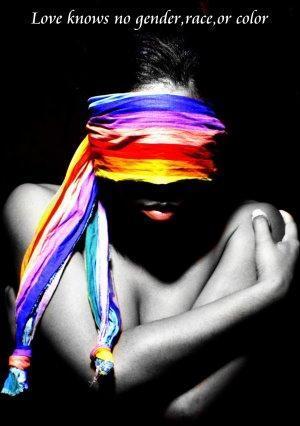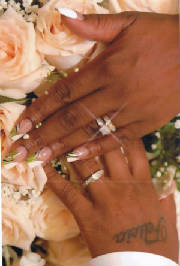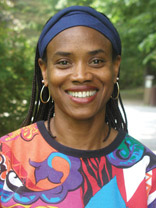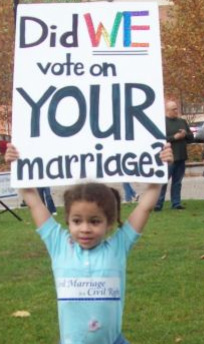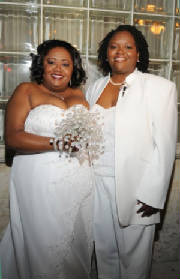
|
|
| Home | The Editor's Desk | In My Opinion | Proposition 8 | ALPHA LAMBDA ZETA | Writer's Block | The Forgotten Culture | Valentine Raffel | All American Pageantry | Profilez | Hot Pointz | A Spiritual You | In Da Corner | Lesbian Health | Commentary | Mailbag | Contact Us | Event Planner |
|
Proposition 8 |
|
Rev. Irene Monroe is a Ford Fellow and doctoral candidate at Harvard Divinity School. One of Monroe’s outreach
ministries is the several religion columns she writes - “The Religion Thang,” for In Newsweekly, the largest lesbian, gay, bisexual, and transgender newspaper that circulates widely throughout New England, “Faith
Matters” for The Advocate Magazine, a national gay & lesbian magazine, and “Queer Take,” for The Witness, a progressive Episcopalian journal. Her writings have also appeared in Boston Herald and in the Boston Globe. Her
award-winning essay, “Louis Farrakhan’s Ministry of Misogyny and Homophobia”, was greeted with
critical acclaim.
|
|
One thing we do know is that our community is energized and engaged – perhaps more than ever
before. We must harness this energy into productive means to further the fight for equality. A large part of this will
depend on continuing to build a coalition of supporters who see both our pain and our determination, and are committed to
standing side by side with us in this battle for equal rights for all. The following Q&A is designed to answer many of the pressing questions related to the passage of
Prop 8. Q: What does Prop 8’s passage means for lesbian and gay couples who
married in California between June 16 and November 4, 2008? A: The California Secretary of State, Debra Brown (as well as the Attorney General, Jerry Brown), has
said that she does not believe Prop 8 retroactively invalidates these marriages, and LGBT groups agree. However, there
has not been a final decision on this issue. Unfortunately, for now, we must wait and see what the California government
decides to do. Q: What legal recourse do we have? A: The American Civil Liberties Union, Lambda Legal, and The National Center for Lesbian Rights filed
a lawsuit in California claiming that Proposition 8 undoes the California constitution’s core commitment to equality
for everyone and that it impedes the court’s essential role of securing equal protections for minorities. The
lawsuit argues that a change of this magnitude needed the state legislature’s approval (which was not sought) before
going on the ballot. A wide range of groups and organizations have filed petitions supporting this case, including 44
members of the California Legislature, the City and County of San Francisco and the City of Los Angeles, the NAACP of California,
the Mexican American Legal Defense and Educational Fund, California Women’s Law Center and the California Council of
Churches, just to name a few. We urge the community to be patient while these organizations, including NCLR, which successfully litigated
the In re Marriages case that originally recognized marriage equality in California last May, focus all of their
resources on winning this case. We understand the urge to take further legal action, but implore the community to wait
for the results of this case before beginning further litigation. It is important to remember that after eight years
of judges being appointed by President Bush, the composition of our federal courts in particular does not bode well for the
success of such actions. For more information, please see the joint advisory published by many LGBT organizations, including
HRC, entitled “Make Change, Not Lawsuits,” which although published before Prop 8, is still relevant. Q: What are the next steps? What can be done to reverse Prop 8? A: We are currently awaiting the outcome of the lawsuit filed by the ACLU, Lambda, and NCLR, which
has the potential to invalidate Prop 8. If that suit is unsuccessful, the California Constitution could be amended to
remove the language created by Prop 8 by following the same procedures for amendment that created it. As we await this decision, supporters have mobilized through the country. Last weekend, marchers
in all 50 states in Join the Impact rallies called not only for justice for LGBT families, but for an end to all the oppressions
that hold our nation back and give the false impression that our differences are more profound than what we have in common. Q: Is it true that the minority vote, specifically that of African Americans, was a significant
factor in the passage of prop 8? A: The African American vote did not cause Prop 8 to pass. However, some exit poll data indicates
that support for Prop 8 in the African American community may have been higher than in many other demographics, and this demonstrates
that the LGBT movement has significant work left to do in the African American community to build bridges to unite us, rather
than divide. We must remember that we are all fighting for the same civil rights. There are also many prominent African
American leaders who support marriage equality such as Julian Bond and John Lewis. Q: Why isn’t HRC, or another organization, trying to challenge the legality of the bans
based on the U.S. Constitution? A: There have been cases that claim laws favor or impose one set of religious beliefs over another,
but they have not so far been successful. While to us, full supporters of equality, defending equal rights for the LGBT
community under the First Amendment, or other provisions of the U.S. Constitution is logical, we must remember that not everyone
sees equal rights as we do, particularly the judges President Bush has put in place over the past eight years. We do believe that marriage recognition must occur on the federal level. President-elect Obama
supports the repeal of the Defense of Marriage Act, which is one major hurdle. However, forcing this issue into the
spotlight without sufficient support for success, and potentially having a Supreme Court decision against marriage equality,
would be tragic for the equal rights movement. Q: What about the separation of church and state? A: Many people have expressed concerns over polling locations in churches. We are exploring the
instances we have heard of where someone felt a polling location had posted inappropriate material or information designed
to sway someone’s vote. We take this very seriously and are in contact with allied organizations as well. Q: Should we use civil disobedience, such as not paying our taxes, to protest this inequality? A: The choice to engage in civil disobedience is a personal one. However, HRC does not
endorse or condone any illegal activities. We encourage supporters to fully investigate the possible repercussions for
any act of civil disobedience they are considering before making a decision. Q: There has been a lot of publicity surrounding the support of churches, specifically the
Mormon Church, for Prop 8; isn’t that illegal? A: A church, as a 501(c) (3), is prohibited from political campaign intervention on behalf of candidates.
It is not prohibited from ballot measure work, which the IRS treats as lobbying activity (because it is essentially lobbying
the general public). The amount that a church can spend on ballot measure work, or other lobbying activities, is, however,
limited to an insubstantial part of their overall activities. We ask that advocates of LGBT equality not paint the Mormon Church with a broad brush. There
were, in fact, members within the Church who joined us against Prop 8. As leaders in the movement for equal rights,
it is important to not vilify a whole religion for the bigotry and hate of some members. |

